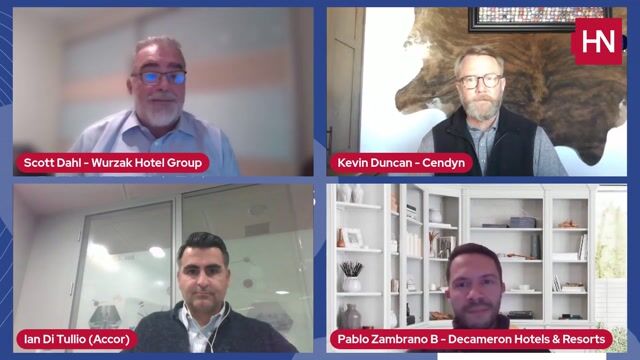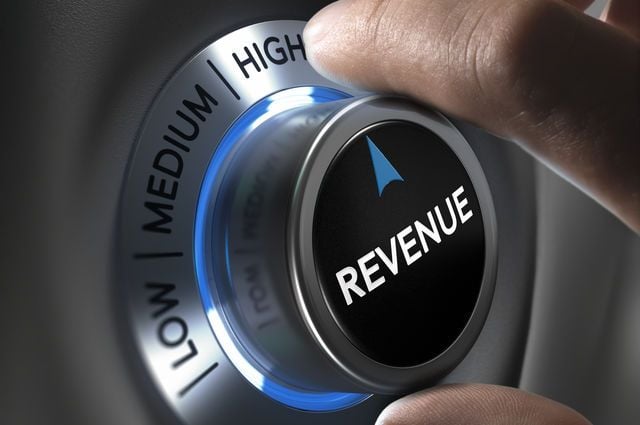Is the fine line between data driven decision making and analysis paralysis unavoidable?
13 experts shared their view
As most of us have already heard, 90% of the world's data was created in the last ten years, and the amount of data created grows at a faster rate every year. The hotel industry is far from immune, with the various sources of business intelligence available today having exploded from the days when a few large Excel files and a weekly STR report was enough to get every Revenue Manager labeled a nerd.
The successful Revenue Manager today has transitioned from the historical "geek who can speak" to a skilled "data-driven storyteller." Many experts recognize that to use data effectively in this environment, the decision which data NOT to analyze is often the most important one.
So, considering all of this we asked our expert panel: How do you avoid the fine line between data-driven decision making and analysis paralysis?

This World Panel Viewpoint is sponsored by Cendyn™
More information
How do you avoid the fine line between data-driven decision making and analysis paralysis?
Don't ask humans to make that decision.
Rely on ML algorithms that have developed to the point that allows us to answer this question intelligently and objectively.
The purpose of gathering and analyzing information is to produce a strategic course of action which changes or improves our desired outcome. Our goal is to reduce the time between data gathering and formulating and implementing actionable outcomes, or what I refer to as analytics efficiency.
Related article by Raul Moronta
There is no fine line. There is just misconception. We have been drilled as an industry to see data analytics as this art that we are too "dumb" to understand as a user. Therefore the industry was driven by BI and Revenue vendors with even bigger dashboards, even more details "because without it you cannot live". Absolute BS! Simplification is the key. I woul guess that 90% of the time you come to the same conclusion before and after you did the analysis.
So if you are a hotelier reading this:
- Follow my Visualize Analyze Optimize method for a guranteed success
- BI dashboards are shiny objects, but if you dont understand it then no point having it
In the hotel industry, knowledge is power: the power to improve & grow revenue streams. With all of the technological improvements in storing and processing the raw materials of data knowledge, there’s a whole lot of potential just waiting to be unlocked. However, there is an assumption that revenue managers have access to all of the data at their fingertips. Over the past two years, we have made great strides here, but our industry is still fragmented between the old legacy systems and unique makeup of differing brands, franchisees, and management companies.
The path forward is to first automate all data streams and consolidate into one commercial platform that bridges the strategies between revenue, sales, and marketing. In an ideal world, this would also include total revenue streams (f&b and ancillary revenues) and potentially even some key costs like labor and channel costs. To elevate the revenue manager's role and avoid analysis paralysis, it's critical to use smart, automated alerts that assist the RM to manage by exception and surface actionable insights across the commercial platform and entire portfolio.
In economics, one of the most well-known concepts is the Law of diminishing returns. What the law states is: As an investment in a particular area increases, the rate of profit from that investment, after a certain point, will decrease. Translated in Data analysis, one does not need to have 100% of the information to make the right decision.
The business world is, by definition, uncertain, and striving to have all the data at hand will slow down decision-making. Conversely, not having any information will lead to no decision or a bad one.
As in all things, the answer lies somewhere in between. A good-enough level that provides the right context and the right data points arranged and connected in the form of a data story or a narrative. This data story should achieve two goals: 1. Help the consumer of information form even better questions for the topic at hand and 2. Improve the confidence level of the decision-maker to go in a specific direction, or 3. Open up new options.
Related article by Vassilis Syropoulos
A typical hotel has to make roughly five million pricing decisions every year (IDEAS).The data fragmentation in hospitality exasperates the problem. Data - guest data, comp set and market BI data - lives in multiple "data islands" that do not talk to each other: PMS, CRS, WBE, CRM, ORM, CMS, DMS, Social Media, and BI.
How do you avoid data overload and analysis paralysis? In my view, the ONLY solution to this conundrum is implementing an AI-powered cloud RMS.
An RMS, supported by a seasoned human revenue manager and utilizing real-time market, travel demand and comp set analytics, website and digital marketing analytics, and online reputation/consumer sentiment data feeds to optimize performance can achieve a near-perfect real-time pricing in response to market dynamics, and significantly enhance GOPAR (Gross Profit per available room).
Now is the time to convince management and ownership that only a cloud AI-powered revenue management system (RMS) can help the property maximize revenues and successfully compete in the super complex post-crisis marketplace.
Related article by Max Starkov
Finding the actual story is the most essential part of being a compelling "data-driven storyteller". Consider the following questions when reviewing data and finding the true story:
- Is the data meaningful, unambiguous, and widely understood?
- Does the data have a high level of integrity?
- Does the data provide context?
If you cannot answer yes to the questions above, then you may be looking at random data that may not be relevant or needs further scrutiny. It's important to find data that brings context to a situation.
The successful revenue manager will take relevant data and have the ability to take complex ideas and simplify them in a story format that ultimately inspires change and action.
Start by asking yourself two key questions:
- What factors truly drive my business?
- What am I trying to achieve?
By having a clear understanding of what influences financial performance, you will be better positioned to determine what sorts of data and insights are helpful to consider.
For example, if your property is in an urban environment with competitors in close physical proximity offering similar services, then regular reviews of competitive price positioing would be advisable. Conversely if you are running a seasonal resort property, then perhaps factors such as weather forecasts (i.e. snowfall), unit type utilization by lead time or existing internal compression may be more important.
It is also vital that stakeholders are aligned on strategy and that objectives are clearly articulated. Analysis paralysis is a real risk if stakeholder alignment doesn't exist.
Final thoughts:
In today's dynamic environment, the answers to the above questions may not be readily apparent so don't be afraid to experiment with what may be possible. Taking action in the face of ambiguiity takes courage, and remember, concious inaction is also an action. With this frame of reference, its always better to be in the driver seat.
Revenue managers nowadays have not only huge revenue-related amounts of data at their hands but with the commercial evolution of the role, a potentially even larger data panel that taps into digital, marketing, and sales. With so much information, you must be able to focus on what is essential for your strategy at any given time: you must prioritize.
Manage your data into two differerent ways:
- Define one set of data to get the picture of what is going on at your hotel and stay on track with your revenue management performance. Find your comfort data set to maintain real-time control of your strategy.
- Use all your other available data sources as a strategic and dynamic weapon to build specific toolsets of data to leverage for deeper analysis, based on your specific priorities of the moment.
As a human revenue manager, you must discern what is important from what is urgent and analyze your data in timely effectiveness to avoid data paralysis and time waste. As an effective storyteller, you must learn to seize the most relevant insights and translate complex data into understandable content for your stakeholders.
Data-driven decision-making can be very effective, but only if you know where you want to play (which category of hotel and target audience) and have a strategy for winning. So having a clear vision, a broad strategy, and data to verify that you're moving in the right direction caps the data that needs to be analyzed and minimizes the risk of analysis paralysis.
Gather only the data relevant to your strategy to limit the risk of data overload, but without limiting access to data. There is still a need to make relevant data readily available for people working in commercial and management roles. Organize data from all siloed systems into one centrally accessible system for all positions in the commercial team and top management. However, without knowledge and skills in data management, including how to structure data in the most meaningful way and ensure high data quality, hotels risk collecting irrelevant, low-quality data and making the wrong conclusions. When viewing data, always start with the big picture and avoid digging too deep into details. Analysis paralysis means wasting valuable time on irrelevant details instead of focusing on what impacts growing revenue and profits.
To avoid analysis paralysis I would suggest starting with an audit of your current setup:
- Which data sources are you checking and how do you access them?
- Where do you spend most time and how does the time spent correlates to the impact?
- Consider changing processes when time spent vs. impact is out of balance.
- Always ask yourself if the data will help you make better decisions.
When deciding if you'll introduce new data sources to your process I would evaluate what moves the needle for your property. What are the main profit centres? What are your goals and which challenges do you currently face or foresee to reach these goals? Which data sources would be able to provide clarity?
In addition, I would consider checking if you can automate the less strategic, more tactical decisions by using tools built on machine learning. Ideally some time will free up to consult different data sources for more strategic and high impact decisions.
Look for solutions that process and visualise the data in meaningful ways so less time is spent on the analysis or looking for clues in a sea of numbers and more time can be spent on actual decision making.
Related article by Niki Van den Broeck
In the next five years, the world will have increased its data from 36 to 163 Zettabytes. The hotel industry is not immune to that deluge, and revenue managers everywhere are faced with the challenge of dealing with it. Here are three recommendations:
- Don't try to do it manually. No matter what type or size of hotel, there is technology that will enable you to aggregate and consolidate data from a large number of sources and make it easier for you to make decisions.
- For any technology purchase, the number one priority should be how well it integrates with and flows across systems and how trustworthy it is.
- Work towards moving up your "revenue management" value chain. You are not (or should not) be paid to produce reports. A revenue manager is paid to produce a strategy for the business they are responsible for. Focus your work to a maximum of 20% on data gathering/preparation and 80% on decision-making.
With tightly integrated systems that automate the flow of data and produce trustworthy decisions, you will not be faced with "analysis paralysis." Instead, focus on making critical business decisions that enhance the value of your role and business.
Related article by Klaus Kohlmayr
Tipping from data-driven decision-making into analysis paralysis is common, but not unavoidable. Here are some of the lessons we’ve learned from helping hoteliers navigate the world of data.
DO: Leverage the insights and reporting tools available in your tech. Most platforms provide at least a basic level of insights, so you don’t need to start from scratch.
DON’T: Rely just on out-of-the-box solutions without thinking about how they apply to your unique context. Tools will give you trends and suggested actions, but don’t abandon your own market knowledge.DO: Stay on the lookout for new data sources. Ask yourself: “What else would I like to know?” And then seek out that information from your partners.
DON’T: Get lost in data you don’t have a clear need for. If there's nothing you’d change based on the information, let it go.DO: Allow time for experimentation. Being on the front line of discovering what’s changing and what it means for your business (and customers) isn’t always straightforward. Often you need to dig around to find those gems of insight.
DON’T: Follow the rules too strictly. Once you get the science right, allow space for the art and storytelling of analytics to shine.
Related article by Alex Macoun

This World Panel Viewpoint is sponsored by Cendyn™
More information















